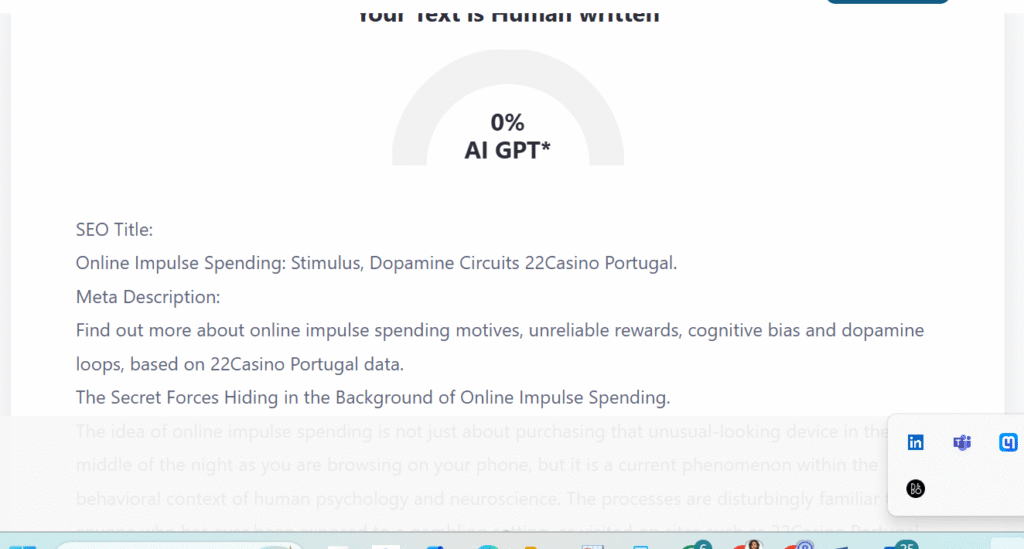
The concept of online impulse spending is not just about purchasing an unusual-looking device in the middle of the night while browsing on your phone. Still, it is a current phenomenon within the behavioral context of human psychology and neuroscience. The processes are disturbingly familiar to anyone who has ever been exposed to a gambling setting, as visited on sites such as 22Casino Portugal, namely the unpredictability of rewards, the immediate satisfaction, and the ability to be subtly influenced and manipulated into not giving in.
Impulse spending refers to expenditures that occur spontaneously and without prior planning—knowing Impulse Spending.
At its most basic level, impulse spending refers to spontaneous purchases that cannot be planned and are primarily driven by the desire to buy, rather than a genuine need. The online world increases this tendency. Convenience is everything; one or two clicks, a shiny pop-up, or a time-bound deal may result in a purchase even before the rational brain has had a chance to notice the decision.
Man is programmed to seek rewards. The emotion of getting a bargain stimulates the same brain circuits as the small jackpot in the casino game. It is that burst of dopamine- the little but relevant boost that leaves you a mini-champion.
Emotional/Cognitive Triggers.
Psychology has a good deal to tell us about the causes of our submission to these impulses. Emotions are in the limelight. Both boredom, stress and even some mild anxiety may drive us to online spending as a fast mood booster. The brain is a dopamine-doping machine that loves instant gratification, and a timely offer can form a sizable loop.
There are cognitive biases that are also working behind the scenes. Scarcity cues (only two left!), urgency framing (offer ends in 30 minutes!), take advantage of our mental shortcuts, which push us towards decisions that are rational in the short term but not usually sustainable. Impulsive decisions are further promoted by anchoring effects —the tendency to base a lot of information on the first piece of information observed. Web applications are designed to exploit these biases, subtly manipulating us without our awareness.
The Neuroscience of Impulse
In neuroscience terms, the act of making impulse purchases is a battle between the prefrontal cortex, where planning and self-control are located, and the nucleus accumbens, where the hotspots of reward anticipation are situated. The reward system may take over rational decision-making when it comes to digital stimuli, particularly in situations involving aspects of unpredictability.
Gamification platforms, also known as variable reward platforms, directly tap into this mechanism. The elements, such as progress bars, spinning wheels or surprise bonuses, even without gambling, provide the feeling of suspense and excitement. The random nature of reward delivery can be compared to the dynamics of progressive jackpot slots — the uncertainty entertains the brain, and the brain is always on its toes, anticipating a win.
Another factor that increases the issue is decision fatigue. The more options we have on the Internet, the less self-control we have, and a simple stimulus, such as a conveniently placed recommendation or a red-coloured notification, is all it takes to make us take a rash step.
Online Spaces and Online Practices.
The strategies of digital engagement are extremely advanced. Each click, scroll, and even hover can serve as an input into the pattern of behaviour that promotes repetition. Consider the 22Casino Portugal interface design: the use of bright highlights, interactive menus, and instant feedback gives the interface a natural rhythm of engagement that is not unnaturally created to retain attention and reward interaction.
They are principles that are borrowed even by non-gambling online platforms. Flash sales, instant out buttons, and reward systems whose values are acquired through games are created to activate the same dopamine loops, exploiting the human preference for instant gratification. Patterns are strengthened by repetition, and impulse spending may become almost addictive with time.
There is also the social influence. Social proof, peer reviews and ratings are subtle appeals to entice us to make purchases. The brain comprehends consensus as a shortcut to good decisions and decision-making and tends to override individual hesitation. When this is combined with the fact that rewards are variable and there is the excitement of the unknown, it creates a powerful formula for impulsive action.
Expert Insights
Online impulse spending has been compared to a low-stakes gambling room by many behavioral economists and neuroscientists. Variable rewards, exploiting cognitive bias, and emotional nudging are grounded in universal principles. By identifying these trigger points in digital casinos, retail sites, or services we subscribe to, it is essential to recognize ourselves.
For people accustomed to game interfaces, it can be eye-opening to see how these mechanisms work outside of gaming. It could be a small discount that seems like a lottery win or a special surprise that induces a dopamine loop; the psychological leverages are the same ones. Awareness is then the initial weapon for making conscious decisions, rather than a reflexive reaction.
